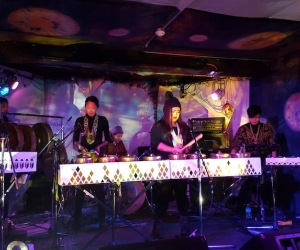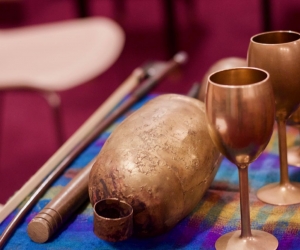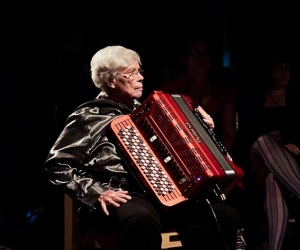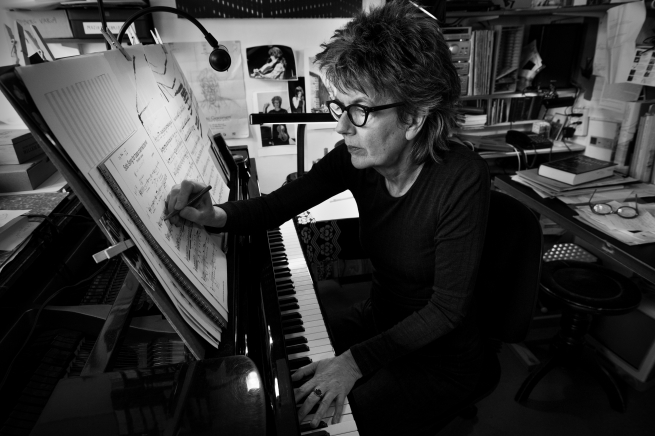
The year is 1979, and Ig Henneman is ready to rock. In pink zebra-print pants and a black tank top, she strikes a power pose on the stage of Amsterdam’s Paradiso. Her gold-painted Barcus-Berry electric viola glows in the spotlight. She is playing a Rock Against Racism show, flanked by her rock band F.C. Gerania, this provocative moment depicted in a red-and-black drawing on the cover of the group’s eponymous record.
Forty-three years later, the improviser-composer Ig Henneman continues to rock. She celebrated her seventy-fifth birthday in September 2021 with a concert held at the Orgelpark in Amsterdam that featured premieres and reinterpretations of her works performed by a who’s who of Dutch experimental musicians and poets. That same day, Henneman was knighted into Holland’s de Orde van Oranje Nassau for her outstanding contribution to the field of contemporary and improvised music.
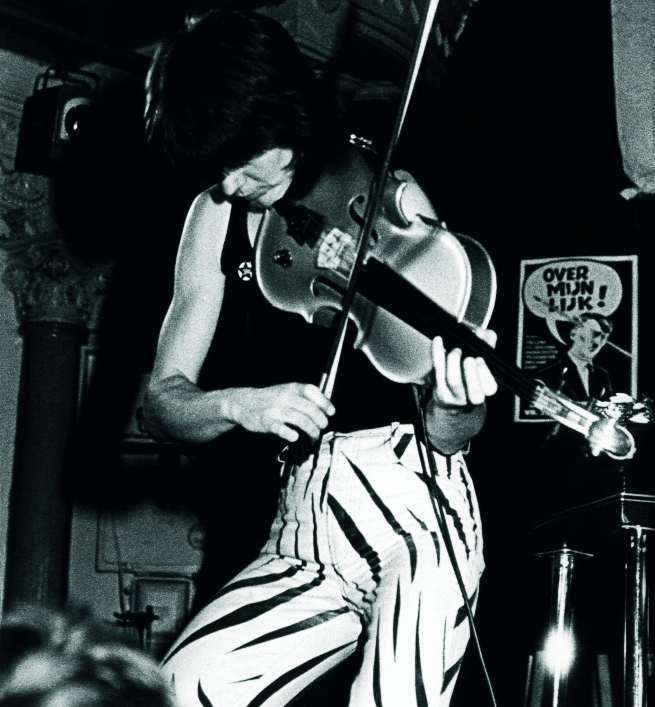
I first heard about Ig Henneman from musicians in Montreal’s free-improvisation community. After the Henneman String Quartet’s album Piazza Pia came out in 2002, I listened to it repeatedly. As a classical violist interested in improvisation, I was riveted by her take on the string quartet: it revolutionized my perception of the possibilities for creative expression free of constraints, while still valuing the ancient tools and techniques of my trade. While on tour in 2012, during a night off in Amsterdam, I went to Bimhuis, Holland’s headquarters for free-improvised music, and was thrilled to discover in the lobby a stack of copies of Ig Henneman 65, a booklet filled with photos and interviews marking Henneman’s sixty-fifth birthday. I entered the concert hall and saw her standing at the back, waiting with the other listeners for the music to start. I introduced myself as a fan and fellow musician, and she welcomed me with an introduction to the venue, the musicians who were about to play, and the table of CDs for sale, released by her own label.
Our paths have crossed many times since then, and my admiration has extended beyond Piazza Pia to include her catalogue of more than twenty recordings. “I come from a family where, if you want something, you go for it,” Henneman said from her Amsterdam studio during a Zoom interview this past winter. She credits her parents with instilling the curiosity and discipline she and her siblings needed to pursue adventurous lines of work. “It was not a hippie family at all. We were really streng—really strict. I was educated with discipline. More and more I realize how important that is for people to grow. It’s about sitting long enough to make something.”
As a child, Henneman studied classical piano and violin before finding the viola. “At that time, it was mainly about being in tune and playing virtuosically,” she said of her conservatory education. “I always knew—this is not my life.” In early years, she overheard her brother’s Thelonious Monk records on the other side of the door at home. “Monk became one of my biggest inspirations as a piano player, improviser, composer. But at that time, it was not a girl’s world. I didn’t have access.”
She started playing in symphony orchestras, with the Asko contemporary music ensemble, and as a piano accompanist for ballet classes, quoting Bach and improvising over harmonic progressions, searching for her world.
The formation in the late 1970s of F.C. Gerania, her rock band with Regina Gorter (bass), Ansje Rietbergen (drums, vocals), Carolien Schönfeld (lead vocals, trumpet), and Cora Hollema (saxophone, vocals, keyboards), was a major development in Henneman’s musical path. On the band’s independent albums F.C. Gerania (1981) and Get the Knack (1983) she played keyboards and electric viola, sang, and wrote songs. “I learned so much from that period,” she says of the D.I.Y. ethos of the band. “We did everything ourselves: management, producing LPs, soldering microphones, carrying gear, which meant a P.A. system at the time . . . I started composing in a rock band.”
In the mid 1980s, Henneman moved from songwriting to film scoring. “There were a lot of documentaries by women directors who were looking for scores. Many women artists from that time have fallen out of the canon since then. It was like now: women artists are being asked to write film music again—it’s strange but it seems like it’s still necessary.” She composed music for a 1927 Russian silent movie by Olga Preobrazhenskaya which was released in 1984 as The Women of Ryazan by the Dutch feminist film distribution company Cinemien. The recording of the score was performed by a chamber ensemble of Dutch musicians, including Henneman on strings.
Around this time, Henneman was also becoming involved in Amsterdam’s improvised music scene. She joined trumpeter, pianist, and composer Nedly Elstak’s ensembles and soon formed her own, the Ig Henneman Quintet. This marked the beginning of Henneman’s role as bandleader and organizer, which soon became a major element of her career. Composing, directing, and producing extensive tours and recordings of her quintet, sextet, tentet, and the Henneman String Quartet were the heart of her creative output.
In 1993, Henneman and reed player, improviser, and composer Ab Baars, life partner and primary collaborator, created Stichting Wig (the Wig Foundation) to facilitate album and tour production. “When somebody else doesn’t do it, I do it myself,” she shrugs.
Wig has flourished as a widely respected record label and production company for improvised and composed music, releasing more than thirty albums and producing hundreds of concerts by Henneman, Baars, and their collaborators.
Moving into leadership positions was natural for Henneman. “It’s a family thing, it’s my character that I dare to do that,” she explains, adding, “Only afterwards, I can say being the boss of something—it’s not easy. I am a woman and mostly the oldest in my groups. At a certain point, I was exhausted.” Henneman’s burnout was exacerbated by gender inequalities in the rock, improvisation, and contemporary composition communities. “I am a feminist. I had so many discussions about feminism in the seven years in the rock band. I was quieter about that after. I didn’t want to think about this woman’s thing in my work anymore.”
Henneman is not the only musician with feminism fatigue. Montreal-based clarinet player, improviser, and composer Lori Freedman, Henneman’s long-time collaborator, told me in a video chat, “I didn’t grow up with ideas of what you were and were not supposed to do. I learned that in classical music, and then I left classical music.
“As creative musicians, women have to be five million times better if we’re going to be heard. I do believe that. We have to be a lot better than our male counterparts. If you have a role model, that implies that you know somebody else who was doing what they were not told to do. And I don’t know of anybody I aspired to be like.”
Freedman sees an opportunity to move past gender constructs in instrumental improvised and creative music. “Our music is not gendered. It’s not binary. It’s not like dance. It’s not like singer-songwriter. It’s not like writing, even. I want to receive the idea and then find out where it came from afterwards.”
Henneman loved Queen Mab, Freedman’s duo with jazz pianist and improviser Marilyn Lerner—in particular, their album Close, which consists of trios with guest musicians. She proposed to join them for a North American tour, which took place in 2002, after which she became a permanent member. “Working with Ig was huge for both Marilyn and me,” Freedman said. “It was brilliant in so many ways, not the least of which is what I saw her accomplish as an administrator. She was able to bring us to Europe several times and all around North America even more times. Anything she wanted to do, she seemed able to do it.”
Each of the Queen Mab Trio members first encountered her instrument through childhood classical lessons and branched out to develop a unique improvisation practice. During the trio’s early years, all three were developing their composition chops. “Queen Mab was based in improv, but right from the get-go, we decided that we wanted to write some things down as guidelines for pieces or sections of sets,” Freedman explained. “We had some pieces that were entirely written; some that we talked about, then named to provide triggers and springboards; and others that were completely improvised.”
While Henneman was performing in Queen Mab and, since 1999, in the Duo Baars-Henneman, she continued to direct her own ensembles until deciding in 2014 to stop doing it. “In my own groups, I never had enough time to improvise because I was also always writing and giving roles to everybody. I love to do that, but [stopping] it was kind of a new life in that sense.”
The formation of the improvising ensemble Perch Hen Brock & Rain, comprising Duo Baars-Henneman and the American duo of saxophonist Ingrid Laubrock and drummer Tom Rainey, was the impetus for Henneman’s return to improvisation. The group performed for the first time at the 2014 Jazz Happening Tampere, an annual jazz festival in Finland. The show was recorded and released a couple of years later as Live @ Jazz Happening Tampere. Henneman could still feel the electricity of the quartet’s performance. As she described it: “It’s incredible! I’m just exploding almost! It was one of the happiest moments of my life as an improviser.”
When asked about her current relationship to her instrument, she continued, “I love to play. In that sense I am very fond of my viola. But I neglect it, poor thing! I am composing and producing a lot during this pandemic. I’m happy when I’m involved as an improviser. Now I play with so much more freedom. It’s not about technique, it’s about what you want to say.”
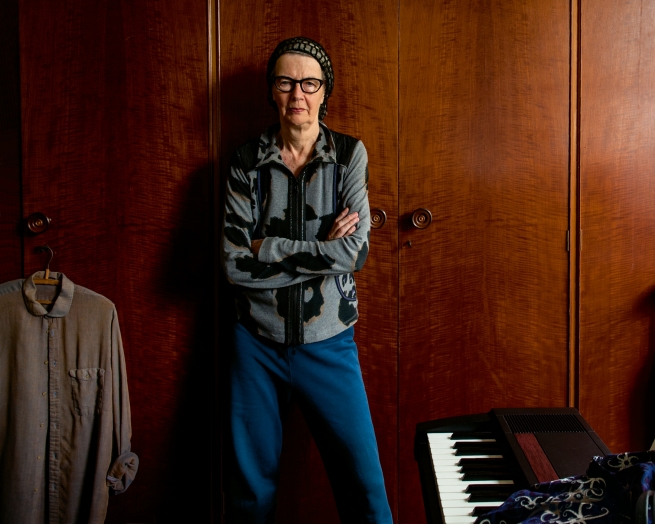
Henneman’s path as a composer has been a gradual evolution, marked by moments of clarity. In 1989, she attended a lunch concert featuring the work of the late Russian composer Galina Ustvolskaya and something clicked, affecting the course of her work from that point. “I was totally blown off my chair; I recognized it,” she said. “Hearing her scores and piano music confirmed that you can use only a few notes. Because I’m not a classically trained composer, I don’t have that burden of how a score should look.”
The music of Russian composer Sofia Gubaidulina, who also attended the 1989 concert, is another major source of inspiration for Henneman. “Sofia Gubaidulina says that composing is an academic thing, and that you must also use your intuition. She is also an improviser, using traditional Russian instruments, who says that improvising feeds intuition. She put into words some things I had a feeling about. In ’89, I didn’t dare to call myself a composer yet, but looking back I realize that I have been a composer since the beginning of the ’80s. I’m not a classically trained composer. I live in all these different worlds, and show all the different things that I am.”
Like many musicians composing in the context of improvised music, Henneman frequently composes for the distinctive playing of specific musicians, rather than writing music to be interpreted from a printed score by any instrumentalist. In addition to the graphic scores and sketches used to express these structured improvisations, she also composes fully notated music. This combination of composition styles is now becoming more common as improvised music and contemporary classical music become increasingly congruous, but Henneman’s experience in the 1980s was less obvious. “I wanted to write for strings, but at the time it wasn’t easy to find people who could read and improvise,” she said. “Now the curious players of contemporary music are familiar with improvisation.”
For her 2019 collection Solo Songs for Instruments, poetic texts are spoken and sung by the instrumentalists. “I’m fond of songs, Lieder, and I like to work with poems for atmosphere and rhythm. I did these pieces with voice to bring together my whole life: songwriting, improvisation, and composition.”
For her seventy-fifth birthday concert, Composers Portrait: Ig Henneman 75, Henneman invited a poet and ten of her musical collaborators to perform works spanning different phases of her compositional journey: early works, improvisations, and premieres. The program included a selection of songs from 1994 based on poems written by Ingeborg Bachmann and dedicated to Henneman’s mother; a new arrangement of Galina U, written in honour of Galina Ustvolskaya for the Queen Mab Trio; Bow Valley, composed with field recordings from the Banff Centre in 2006 for the flutist Anne La Berge; and Solo Song for cello – As if –, based on a poem by Emily Dickinson and performed by cellist Lidy Blijdorp, who recorded it in 2019.
For her 2021 string quartet Outside the Rain Has Stopped, Henneman worked extensively during the composition process with the Luna String Quartet to develop her vision for a classical string-quartet formation—two violins, viola and cello—without hierarchy. The result is a powerful work in which the quartet members breathe, speak, and snarl like one beast in an intuitive flow, influenced by American pianist-improviser Cecil Taylor.
The Orgelpark venue houses nine pipe organs, four of which Henneman used in the concert. Her attraction to writing for organ is rooted in childhood memories of church, as well as the long tradition of organ improvisation. One of the themes she has composed for the International Organ Improvisation Competition in Haarlem was performed at the concert by Ansgar Wallenhorst. The final premiere on the program, February’s Turn, was commissioned for the Cavaillé-Coll organ at the Orgelpark and was performed by Gerrie Meijers, who worked intensely with Henneman during the composition process to explore this particular instrument’s vast colour possibilities.
While Henneman planned her concert, a surprise ceremony to induct her into Holland’s de Orde van Oranje Nassau was in the works. At the close of the concert, the Deputy Mayor of Amsterdam, Touria Meliani, rose and gave a speech. “As an autonomous and authentic cultural entrepreneur, you crossed borders, went against the current, and shook up the established order. With perseverance, rock-solid conviction, and no interest in monetary gain, you stood up for free expression, for young talent, and for women in music.”
“I never won a prize. I’m not in one field. And I’m a woman. And I’m an old woman!” Henneman laughed, adding emphatically, “I had never heard such good words about me. When I heard the speech I realized: it’s significant, what happened here.”
Marielle Groven, a Canadian composer and improviser living in Amsterdam, is a production manager at the Orgelpark and was assisting with organ registration—pulling stops for the organist—at the concert. As a creative musician entering mid career, Groven feels the significance of Henneman’s work. “Walking this path feels risky,” she told me. “There’s something about seeing a woman who has walked that path for fifty-odd years now—it really matters. For anybody to do that takes a lot of courage. It makes it seem possible.” Groven was moved by Henneman’s reaction to the surprise ceremony. “When it became clear what was happening, Ig brought everybody on stage. That really highlighted something for me. She showed that she comes from a culture, from a community.”
Groven appreciates the intergenerational character of Holland’s improv scene and describes how experienced players act as unofficial mentors. “I keep seeing, time and time again, they just continue to rock. If you want to connect to the young people, just light yourself up and rock. People can be in their nineties, and they are turning the young people on by rocking out. And that’s never gonna go out of style.”
At the time of our interview, Henneman was working toward several composition deadlines. She is playing improvisation shows and producing albums released by the Wig Foundation and the American creative music cooperative Catalytic Sound. She is also arranging to release recordings of the Composers Portrait concert and would like to make an archive of the notebooks and handwritten scores of her previous works. “Maybe it will help to be a knight,” she laughs, adding “I am listening back to my own music and taking time to reflect in the COVID-19 years. All the things I do, they are coming together now. They’re not separated anymore.
In a culture hungry to consume the next new thing, Ig Henneman endures, as cutting-edge as the newest members of the avant-garde scene. The spare, sharp aesthetic she fought to carve is now in vogue, but rather than resting on the laurels of her previous innovations, she continues to define her practice by experimentation. “Every new work begins with desperate fumbling. It takes some courage to get through that stage.” And yet she perseveres. “It’s a need, once you discover that you want to make something. That is the reason I kept going. For me it is about curiosity: what do you want to say?”
In one of her emails, Henneman told me that she keeps a quote from Shakespeare’s Cymbeline on her studio wall: “Boldness be my friend! Arm me, Audacity, from head to feet.” She signed off with, “Back to work. The fumbling is slowly getting somewhere.”
FYI: The video recording of Ig Henneman 75: composer, improviser, knight was released in May 2022 with English subtitles. The album Outside the Rain Has Stopped features a selection from her Composer’s Portrait concert. Perch Hen Brock & Rain released its second recording in July 2022.
PHOTOS:
Photo of Ig Henneman composing in her studio in May 2016 by Francesca Patella.
Photo Ig Henneman performing with FC Gerania at Rock against Racism in December 1979 by Jean van Lingen.
Photo of Ig Henneman in 2020 by Francesca Patella.
